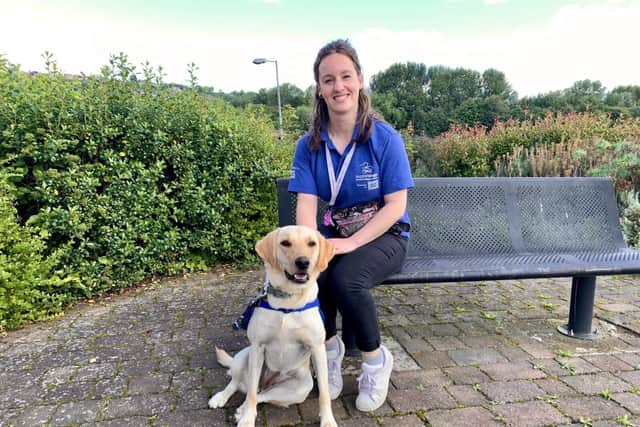A dog's life for Ellie - but she loves it!
and live on Freeview channel 276
Ellie Keen is very much an animal person.
From having pet cats as a child to working at a mustang rescue centre in Florida, USA, to having a job as a supervisor in a pet shop, she has always had an affinity with creatures of all shapes and sizes.
The 27-year-old even studied animal behaviour and training at university, cementing her thirst for learning about and working with animals.
Advertisement
Hide AdAdvertisement
Hide Ad

For the past two years, Ellie has been working as a trainer with Support Dogs, a Sheffield-based national charity, which provides and trains dogs to help autistic children, adults with epilepsy and adults with a physical disability, to lead safer, more independent lives.
She plays an instrumental role in honing the skills of dogs to transform the lives of clients.
“Since I was young, I have been helping out at my local yard – it was more horses until I got to university, when I made the switch to animals in general. My degree was dog based – there was a lot of theory around training dogs,” said Ellie.
After university, Ellie, who is originally from Brighton, went back to working in the pet shop, but as this was around the time of lockdown, like many others, she found it difficult maintaining a job in retail.
Advertisement
Hide AdAdvertisement
Hide Ad

“I wanted to do something more tailored to what I wanted to do,” she said.
So Ellie applied for a job with Support Dogs and after being accepted, she upped sticks and moved more than 230 miles north to Sheffield to take up the role.
Describing what her job entails, Ellie, who recently moved her 13-year-old Maine Coon cat, Huggy from Brighton to live with her, said: “I train the older dogs that have either come from the puppy team or have been donated to us, until they go to their client.
“That involves either deciding which programme they are going to go to, tailor-training them for that programme, looking at potential clients for them and making sure they would be suitable for that client or tailor-training them to suit that person’s life.“I also work closely with volunteer foster carers who give the dogs homes for evenings and weekends and come into the centre during the day for training.”
Advertisement
Hide AdAdvertisement
Hide AdEllie is usually responsible for the care and training for three dogs at a time.
She said: “I absolutely love it. It really suits me.
“It’s really focused on the dogs, building a bond with them and tailoring the training based on their personalities.”
And what’s the best thing about Ellie’s job at Support Dogs?
“I love just spending time with the dogs and getting to know their individual personalities, creating bonds with them and working on their specific areas that they need help with and problem-solving and trying to train them in a way that best suits the dog,” she said.
Advertisement
Hide AdAdvertisement
Hide AdHaving learned the theory behind animal behaviour, Ellie shed light on dogs’ susceptibility to being trained.
“They are very clever and also very highly domesticated,” said Ellie.
“Also, they are an animal that has a real partnership with people – the human/animal relationship, especially with dogs, is a very tight one.
“They are bred and domesticated in a way that they are companions to us, especially working breeds like Labradors – they want to do things for you and they want to be busy. They want to please you.
Advertisement
Hide AdAdvertisement
Hide Ad“They are easily trainable – all Labradors seem to love food or toys, so it’s quite easy to reward and to motivate.”
She said when it came to the time for a dog to leave her and move to the next stage of training, she had to remain professional.
“It’s hard to see them leave, especially the ones I’ve worked with for a long time,” added Ellie.
“But seeing them with their client makes it all worthwhile – we know that that’s what they are going to do and we want them to get there.”
To find out more about the invaluable work of Support Dogs, please visit www.supportdogs.org.uk